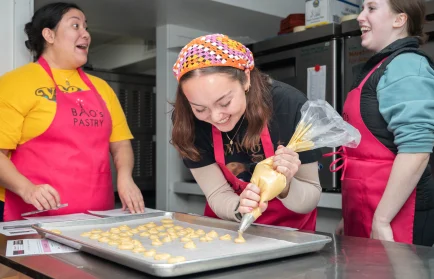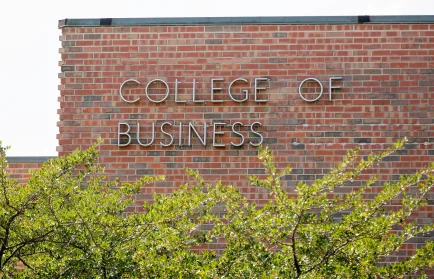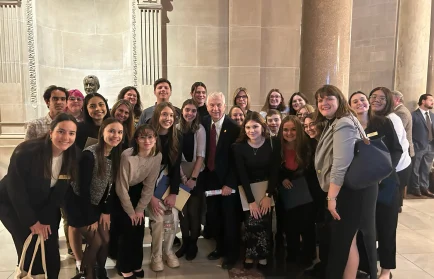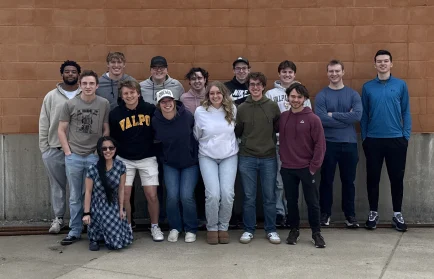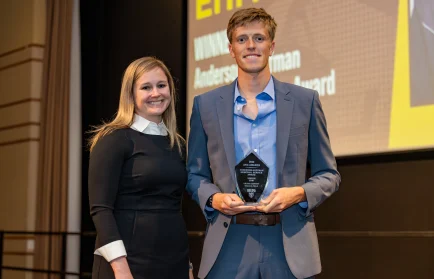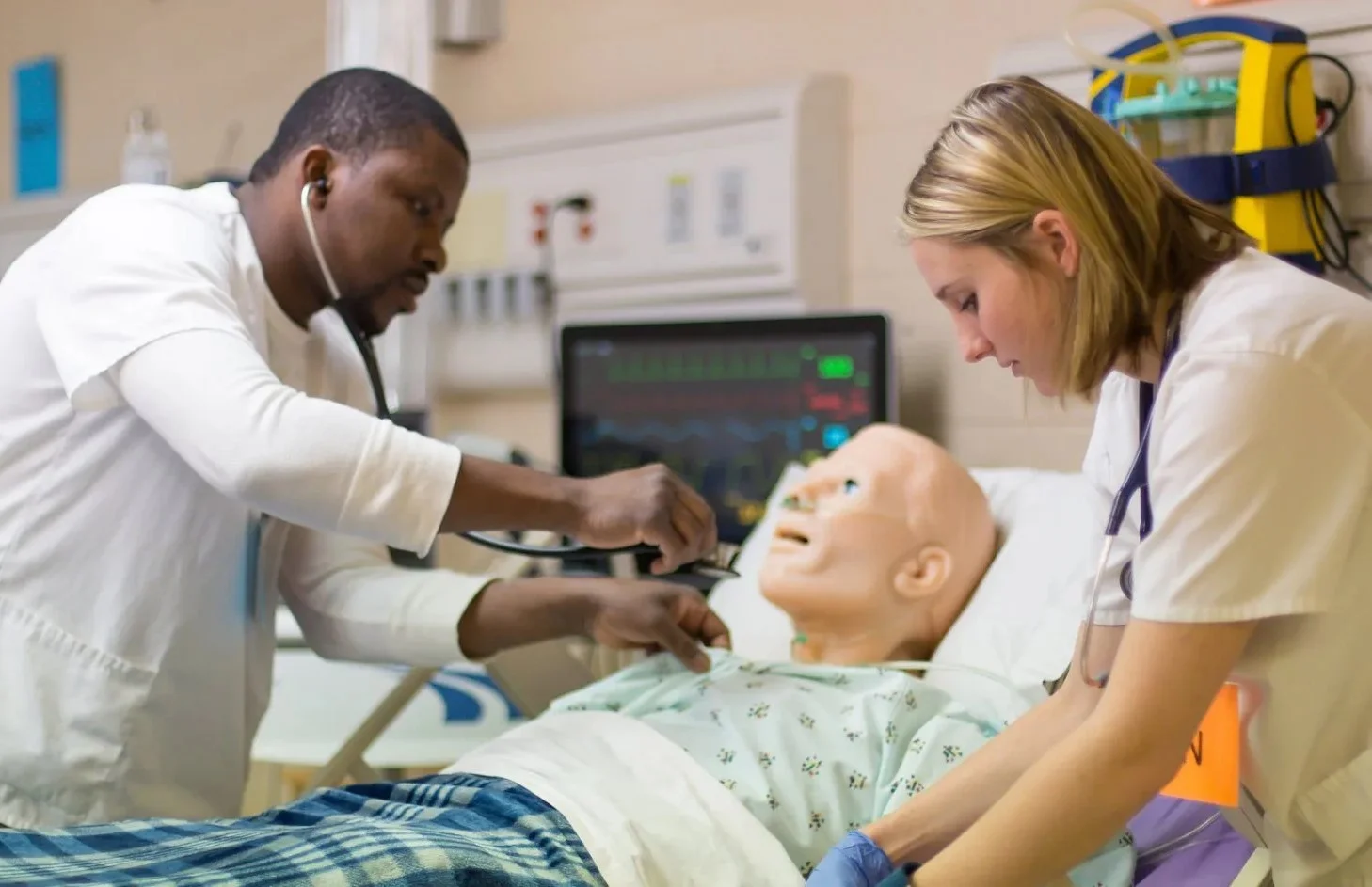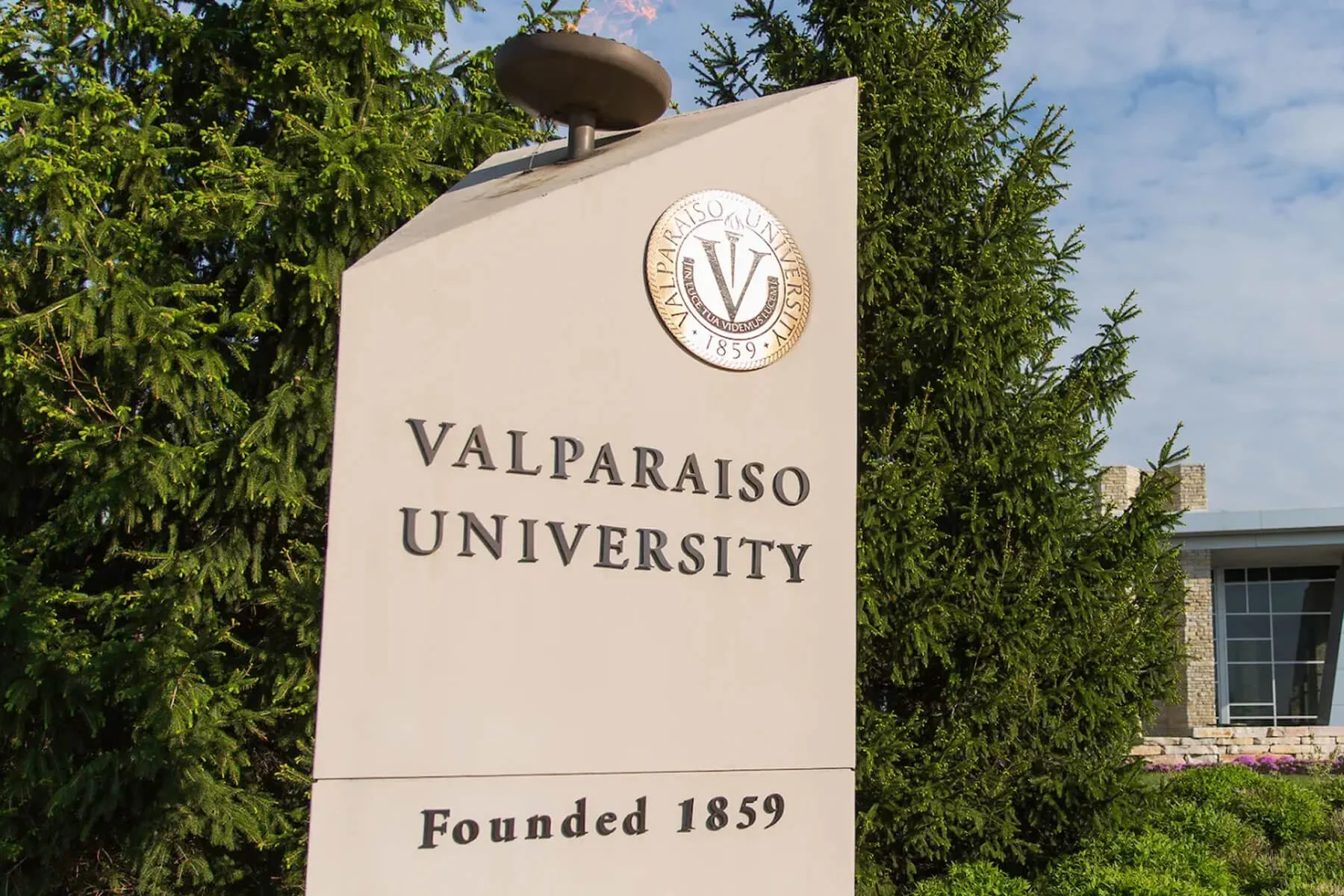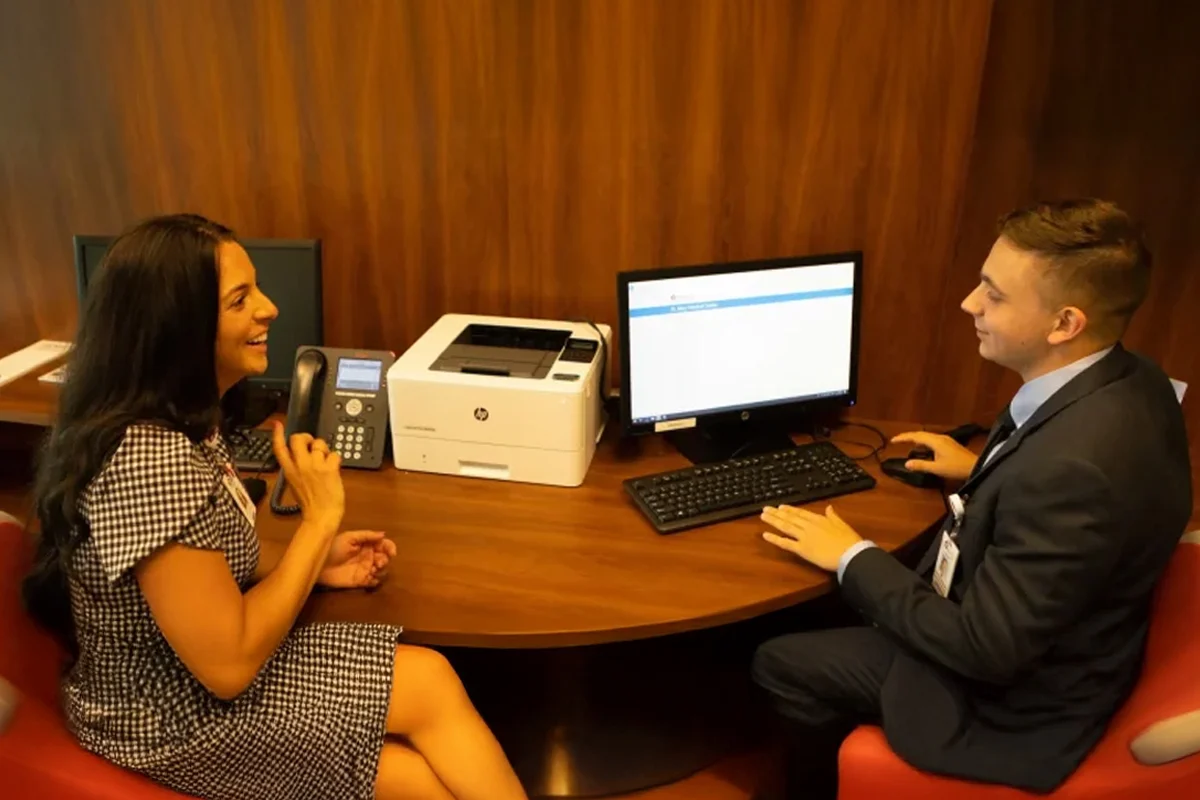Entry-Level Occupational Therapy Doctorate (OTD)
Guided by a commitment to holistic growth and service, Valparaiso University’s OTD program prepares students to lead and thrive in the evolving field of occupational therapy.
About Our Entry-Level Occupational Therapy Doctorate
The doctorate in occupational therapy coursework includes:
- All didactic courses
- Fieldwork experiences (Level I and Level II)
- The doctoral capstone experience
Students must complete 24 weeks of Level II fieldwork as well as a doctoral capstone experience within 6 months following the completion of the didactic portion of the program.
General Information
“IN LUCE TUA VIDEMUS LUCEM…In your light, we see light” is a value deeply instilled in us to go out into the world and be a Beacon of light. The occupational therapy doctorate (OTD) acts as the Lighthouse, being a venue for the occupational therapy students when they join the Valpo community on their journey to becoming the light. Much like the 1904 Michigan City lighthouse is the only public operational lighthouse in Indiana created to be Indiana’s first harbor on Lake Michigan, Valparaiso University’s OTD program will be the only entry-level doctoral program serving the Northwest Indiana community/region.
Much like the Light emitting from a lighthouse serves the community, OTD students will be able to enter the symbolic lighthouse of Valparaiso’s OTD program, guided by the lighthouse keepers (occupational therapy faculty), progressing up each step in the stairwell (each didactic, lab, and clinical experience) until they, as the light, arrive in the lantern room (doctoral capstone project), ready to be guided into place, letting their light shine (representing themselves as leaders through scholarship efforts with completion of their doctoral capstone project and degree completion) across the harbor (their community).
Curricular Threads: Scholarship, Service, Community, and Leadership
The Valparaiso University Occupational Therapy Doctorate Program will prepare practitioners to provide evidence-based occupational therapy services with integrity and interprofessional collaboration to meet the physical and psychosocial needs of diverse people, environments, and organizations.
Valpo OTD Mission – Valparaiso University’s occupational therapy program inspires students to develop a commitment to the profession of occupational therapy as a vocation, utilizing their strengths to meet the needs of their community through leadership, service, and scholarship.
Valpo OTD Vision – Valparaiso University’s occupational therapy aspires to light the way for community transformation through engagement in meaningful occupations.
Upon completion of the Occupational Therapy Doctorate (OTD) Degree, students will be able to demonstrate the following:
- Advocate for occupational therapy services for diverse populations, groups, and individuals as a member of a healthcare team.
- Assess occupational performance of individuals, groups, and populations using evidence-based concepts and principles.
- Provide therapeutic interventions based on client centered care and evidence-based principles.
- Collaborate with the interdisciplinary team, client, and stakeholders to formulate a successful transition from service and document results.
- Complete all duties in an ethical, legal, safe, and professional manner in accordance with state, federal, and association rules/regulations.
Demonstrate the importance of professional development, support professional organizations, and advocate for the future of occupational therapy services.
Goal 1: Prepare graduates with the skills to be compassionate and culturally competent, ethical occupational therapists.
Goal 2: Provide a student-centered adult learner educational environment that enables student success.
Goal 3: Prepare graduates to provide high-quality patient-centered care as collaborative members of an interprofessional healthcare team.
Goal 4: Prepare graduates to lead and serve the profession and in dynamic healthcare environments.
Below is a sample schedule:
| Year | Semester | Course Number | Course | Credits |
|---|---|---|---|---|
| Fall Start Only | ||||
| 1 | Fall | OCTH 701 | OT Theory and Framework | 3 |
| OCTH 703 | Occupational Engagement for the Occupational Therapist | 3 | ||
| OCTH 705 | OT Evaluation and Assessment | 3 | ||
| OCTH 707 | Advanced Anatomy and Human Development Across the Lifespan | 3 | ||
| OCTH 709 | OT Research Clinical Inquiry | 3 | ||
| 15 | ||||
| 1 | Spring | OCTH 715 | Occupational Therapy Ethics and Advocacy | 3 |
| OCTH 716 | Neuroscience for OT | 3 | ||
| OCTH 717 | OT Research Methodology | 3 | ||
| OCTH 730 | OTD Clinical Reasoning | 3 | ||
| OCTH 737 | Assistive Technology | 3 | ||
| 15 | ||||
| 1 | Summer | OCTH 725 | Occupational Therapy Practice in Orthopedics, Work, & Industry | 5 |
| OCTH 727 | Occupational Therapy Practice in Rehabilitation | 5 | ||
| OCTH 741 | Fieldwork Level 1c & Seminar – Rehabilitation Practice | 2 | ||
| 12 | ||||
| 2 | Fall | OCTH 711 | Occupational Therapy Practice in Mental Health | 5 |
| OCTH 712 | Fieldwork Level 1a (psychosocial) & Seminar – Mental Health | 2 | ||
| OCTH 719 | Occupational Therapy Practice with Children & Youth | 5 | ||
| OCTH 720 | Fieldwork Level 1b & Seminar – Children & Youth | 2 | ||
| OCTH 740 | Research Implementation | 3 | ||
| 17 | ||||
| 2 | Spring | OCTH 729 | Capstone Discovery | 2 |
| OCTH 733 | OT in Education | 3 | ||
| OCTH 735 | Occupational Therapy Practice in Productive Aging | 5 | ||
| OCTH 736 | The Elder Mentor Experience | 2 | ||
| OCTH 713 | Occupational Therapy Practice – Specialty Practice | 5 | ||
| 17 | ||||
| 2 | Summer | OCTH 742 | Clinical Competency for the Occupational Therapist | 2 |
| OCTH 745 | Fieldwork Level 2a (12 weeks) (May – August) | 8 | ||
| 10 | ||||
| 3 | Fall | OCTH 747 | Fieldwork Level 2b (12 weeks) (September – December) | 8 |
| OCTH 739 | Capstone Design | 2 | ||
| OCTH 723 | Leading the Profession Through Effective Management | 3 | ||
| 13 | ||||
| 3 | Spring | OCTH 749 | Capstone Implementation (14-16 weeks) | 10 |
| 10 | ||||
| OTD Total | 109 |
| Current Cost | Year 1Fall, Spring Summer | Year 2 Fall, Spring Summer | Year 3 Fall/Spring |
| Tuition | $30,030 | $31,460 | $16,445 |
| Student Fees General fee, liability insurance | $652 | $652 | $652 |
| Health Insurance (can be waived with proof of insurance) | $1,954 | $1,954 | $1,954 |
| Drug Screen and Criminal Background Check | $138 | $117 | $117 |
| BLS Certification | $75 | $0 | $75 |
| Lab Fees | $3,000 | $3,000 | $3,000 |
| Books/Supplies (Approximate cost per semester for books and supplies. Costs vary per semester, with the first semester costs being greater and very low supply costs toward the end of the program) | $2,000 | $2,000 | $2,000 |
| Membership Fees SOTA AOTA IOTA | $150 $75 $30 | $0 $75 $30 | $0 $75$30 |
| Total | $33,104 | $39,238 | $24,348 |
- According to FAFSA (Free Application for Federal Student Aid), cost of attendance is defined as total amount of attending the program, which includes tuition and fees, books, supplies, transportation, loan fees as well as fees associated with distance education.
- Fees are subject to change
In addition to completing the requirements of the Graduate School, students applying to the entry-level Occupational Therapy Doctorate Program must meet the following criteria:
- Two letters of recommendation
- Minimum of a bachelors degree from an accredited institution
- Admission to Valparaiso University as a degree-seeking student
- Undergraduate GPA of 3.3 or higher
- Letter of intent explaining why the candidate is seeking this degree and goals for using this degree (2-page max)
Prerequisite Courses
| CHEM 111 or 121 | Chemistry |
| PSY 110 | General Psychology |
| BIO 151 | A&P 1 |
| PSY 215 | Lifespan Development |
| XS 250 | Medical Terminology |
| BIO 152 | A&P 2 |
| PSY 235 | Abnormal Psychology |
| STAT 140 or PSY 201 | General Statistics |
| ENG 205 | HS Writing |
The prerequisite requirements listed above are in reference to courses offered at Valparaiso University. An applicant may request a course equivalency audit at any time by emailing . Applicants must earn a grade of “C” or higher to fulfill the prerequisite GPA admission criteria.
Application Process
In addition to fulfilling the admission requirements for the Graduate School, invited applicants will also be required to complete a virtual interview.
Admission Pathway with Priority: Valparaiso University alumni with a minimum of a bachelor’s degree and who meet the admission criteria are eligible for admittance into the OTD program. Application and acceptance through the Graduate School are required in order to finalize admission to the OTD.
Standard Admission Pathway: Students who have obtained a minimum of a bachelor’s degree from an accredited institution and meet the prerequisite criteria are eligible to apply to the OTD program. Application and acceptance through the Graduate School are required to finalize admission to the OTD.
Academic and student life policies as well as services for graduate students are listed in the GRADUATE CATALOG, which is administered by the Graduate School on behalf of the Graduate Educational Policy Committee.
- Complete all requirements for didactic, fieldwork, and capstone project per the occupational therapy handbook
- Maintain a minimum GPA of 3.0.
- Demonstrate professionalism during interactions with faculty, supervisors, and peers in accordance with Valparaiso University policy.
- Complete all requirements for degree completion listed in the Graduate Catalog.
The entry-level occupational therapy doctoral degree program has applied for accreditation and has been granted Preaccreditation Status by the Accreditation Council for Occupational Therapy Education (ACOTE) of the American Occupational Therapy Association (AOTA), located at 7501 Wisconsin Avenue, Suite 510E, Bethesda, MD 20814. ACOTE’s telephone number c/o AOTA is (301) 652-AOTA and its web address is www.acoteonline.org. The program must complete an on-site evaluation and be granted Accreditation Status before its graduates will be eligible to sit for the national certification examination for the occupational therapist administered by the National Board for Certification in Occupational Therapy (NBCOT). After successful completion of this exam, the individual will be an Occupational Therapist, Registered (OTR). In addition, all states require licensure to practice; however, state licenses are usually based on the results of the NBCOT Certification Examination. A felony conviction may affect a graduate’s ability to sit for the NBCOT certification examination or attain state licensure.
National Board for Certification in Occupational Therapy Program Outcomes
Entry-level graduates are eligible to sit for the national certification examination for the occupational therapist administered by the National Board for Certification in Occupational Therapy (NBCOT). After successful completion of this exam, the graduate is credentialed to use the title of Occupational Therapist, Registered (OTR). In addition, states require licensure in order to practice; however, state licenses are usually based on the results of the NBCOT Certification Examination. In order to be eligible to sit for the NBCOT examination, and become licensed in the state, an individual must hold a degree from an ACOTE accredited occupational therapy program.
Program results from the National Board for Certification in Occupational Therapy (NBCOT) can be found online at https://www.nbcot.org/Educators-Folder/SchoolPerformance .
Entry-level graduates are eligible to sit for the national certification examination for the occupational therapist administered by the National Board for Certification in Occupational Therapy (NBCOT). After successful completion of this exam, the graduate is credentialed to use the title of Occupational Therapist, Registered (OTR). In addition, states require licensure in order to practice; however, state licenses are usually based on the results of the NBCOT Certification Examination. In order to be eligible to sit for the NBCOT examination, and become licensed in the state, an individual must hold a degree from an ACOTE accredited occupational therapy program.
Program results from the National Board for Certification in Occupational Therapy (NBCOT) can be found online at https://www.nbcot.org/Educators-Folder/SchoolPerformance .
Entry-Level OTD Program Progression Outcomes
| Start/End Months: August 2023 – May 2026 (Gold 26) | |||
|---|---|---|---|
| Program Started | Program Graduated | Graduation Rate | NBCOT Pass Rate |
| 2 | |||
| Start/End Months: August 2024 – May 2027 (Brown 27) | |||
|---|---|---|---|
| Program Started | Program Graduated | Graduation Rate | NBCOT Pass Rate |
| 10 | |||
Program results from the National Board for Certification in Occupational Therapy (NBCOT) for the entry-level OTD degree can be found on the NBCOT website.
Entry-level OTD Program Student Continuance Data
| Program Entry Date – August 2023 (Gold 26) | |||
|---|---|---|---|
| Students | August 2024 | % Sustained | Anticipated Graduation Date |
| 2 | 2 | 100% | May 2026 |
| Start/End Months: August 2024 (Brown 27) | |||
|---|---|---|---|
| Students | August 2024 | % Sustained | Anticipated Graduation Date |
| 10 | 10 | 100% | May 2027 |
| Program Entry Date – 3-year aggregate *not yet available | |||
|---|---|---|---|
| Students | August 2024 | % Sustained | Anticipated Graduation Date |
Meet Our Faculty
Professors. Mentors. Friends. At Valparaiso University, you will work on real-life problems alongside faculty leaders with decades of business experience and a true desire to do what’s best for you.
Graduate Studies

